
|

|

|

|
History Repeating:
The number of refugees, asylum seekers, internally displaced people worldwide has exceeded 50 million for the first time since World War II.
UN International Migration Report 2017
"There are now an estimated 258 million people living in a country other than their country of birth - an increase of 49% since 2000."
Africa is considered to be a "developing" continent.
India, under Gandhi, defeated the British, while China refused to trade with foreigners until the Opium Wars were launched to force trade (1839 to 1842 & 1856 to 1860) - led by USA, Britain, Holland, and France.
UN Millennium Project
The End of Poverty
USD$120M budget
USD$50M donated by George Soros
In 2002, Columbia University provided Professor Jeffrey Sachs with an 8 million dollar house in New York as part of a package to lure him from Harvard to head Columbia's Earth Institute, which was commissioned by the UN in 2002 to lead the Millennium Project.
"The Idealist:
Jeffery Sachs and the Quest to End Poverty"
by Nina Monk (2013)
Why did the United Nations Millennium Project fail?
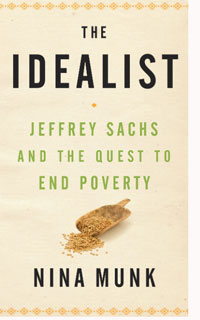
Awarded Book Of The Year 2013 by The Spectator, Forbes, and Bloomberg.
About the book launch
Nina Munk talks about the promise and eventual failure of Jeffrey Sachs' Millennium Village Project that had the end goal of eradicating poverty around the world. Ms Munk spent six years following Jeffrey Sachs and his project team in Africa.
C-SPAN book launch:
Partial transcript
Hosted by the Reason Foundation, New York
September 10, 2013
Moderated by Gene Epstein of Barron's magazine
Nina Munk:
"Jeffrey Sachs really, really, really doesn't understand it."
(replying to a comment re. extreme poverty)
Moderator reads excerpt from book review by Bill Easterly, Development Economist:
"Its not that we chose aid or no AID. AID has had some focused successes such as vaccination programs, but AID cannot achieve the end of poverty. Only home-grown development based on the dynamism of individuals in free societies can do that, just as it did for the lucky people of the world whose forebears climbed out of poverty. Poor people are their own best resource in escaping poverty, conquering problems every day that are far greater than any you or I have to face."
22:31
Nina Munk: It is important to differentiate between charity, between 'doing good' and so-called development.
Moderator quotes P.T.Bower:
"Foreign AID from government to government actually can do harm. And it does harm simply by empowering and strengthening governments that suppress development in their own countries or by supporting corrupt government."
Audience Q & A segment:
Q.
What were the methods Jeffrey Sach employed?
A. Nina Munk: Rather than just building a school in a poor community, or just digging a well, . . . Solving all problems 'holistically' - single minded focus on doing a lot of things all at the same time: putting in a health-care clinic, recruiting nurses, building wells, bringing in diesel generators, fertalizer, high-yield seeds, solving the water problem, vaccinations for livestock, and trying to hit everything all at one go. … Some infrastructure, some very basic health services, and schools, and bringing in teachers, mosquito nets. A package of a dozen fairly low cost basic interventions that together would have an exponential impact. …
|
A modern parable
An anthropologist proposed a game to the kids in an African tribe. He put a basket full of fruit near a tree and told the kids that who ever got there first won the sweet fruits. When he told them to run they all took each others hands and ran together, then sat together enjoying their treats. When he asked them why they had run like that as one could have had all the fruits for himself they said: ''UBUNTU, how can one of us be happy if all the other ones are sad?'' In the Xhosa culture, 'UBUNTU' means: "I am because we are."
European intellectual sensibility, shaped by Rene Descartes (1596-1650) “cogito, ergo sum,” or “I think, therefore I am,” has led to more 'holistic' insights on our place in the world. Consider the African philosophy of “ubuntu”: "I am because you are" An interview with Kenyan literary scholar Professor James Ogude who believes ubuntu might serve as a counterweight to the rampant individualism that’s so pervasive in the contemporary world. >>>more
UNESCO "I am because you are"
For many people in the Bantu language countries of Africa, the term Ubuntu/botho encapsulates all the qualities of a respected member of society. But the term is also used by Africanist scholars as a critique of colonialist doctrine and even forms the core of a humanist ideology upon which the new democratic South Africa is constructed... the virtues to which a person in these societies is expected to aspire – such as compassion, generosity, honesty, magnanimity, empathy, understanding, forgiveness and the ability to share. Indeed, Ubuntu/botho (or the local equivalent in the various Bantu language groups)1 is understood as the very definition of ‘person’ or ‘personhood’. But the term Ubuntu/botho impregnates societies in the region to a much greater extent, forming the basis for communitarian ethics, discourses on identity and even a bourgeoning pan-African ideology... >>>more
The new scramble for Africa
From taking the land to poisoning the land!
Info-graphics sourced HERE:
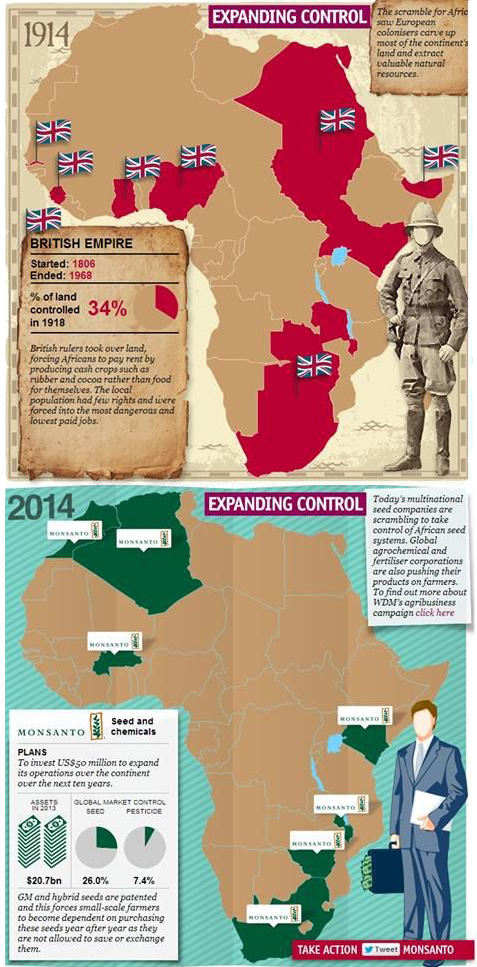
The Scramble for Africa: A History of Independence
Aljazeera 5 Sept, 2010
Excerpt: In 1960, 17 African nations gained independence from resource-hungry Europe. Others followed soon after.
Excerpt: Whether in bustling cities or remote villages, the 1880s and 1890s were years of terrifying upheaval for Africans. Fleet upon fleet of foreign soldiers armed with new weaponry - and a sense of entitlement - descended, seemingly overnight. In the space of just 20 years, 90 percent of Africa was brought under European occupation. Europe had captured a continent. . . .
But with the Second World War - which saw the peak of Europe's dependency on African troops - a powerful genie was released from a bottle - African nationalism. >>> more
|
Q.
Key problem according to Ugandan friend who actually worked with Sachs on some of these programs:
Sachs didn't listen a lot.
He wanted, for example, to talk to presidents and not permanent secretaries of the ministries who knew what was happening on the ground. How much was it about Sachs trying to help people or Sachs trying to show he could do this amazing thing that perhaps would never be duplicated again and would be remembered for a long time? Because you wondered why, with all his connections, why didn't he have programs that would make capital available to African entrepreneurs. We know there are many entrepreneurs who lack access to capital. And, do you think as a consequence of this whole experience with Sachs there is going to be some sort of backlash— people that might want to engage Africa effectively will become a little reluctant now.
A. Nina Munk:
Was he just deluded or was he actually conning himself. Difficult to understand why he wasn't following advice on-the-ground. Why he didn't seem able to change course. . . . Survival mode. Everyone, from government to villagers, is in on it, and quick to assure foreigners that aid is not being wasted. There is an Interdependency But the only way to make donors want to help is to be fully transparent and to speak openly about success and failures. People are more likely to believe in the successes if you are honest about the failures. […] Jeffrey Sach over promised. He was going to give us a model to end poverty that could be scaled up and replicated in any environment, and that is what to this day no one has figured out how to do. . . . We don't know how people are lifted out of poverty. We have an inkling. We understand it is related to economic growth prosperity and wealth re related. But we don't really know what the drivers are. Otherwise we would have ended poverty by now.
37:10
Q.
Sachs is working across scales too. there is the milldam village project, and the mill development goal and now the sustainable development goals that js is helping to lead with the secretary general. He is also raising awareness at very high political levels
A. Nina Munk:
Africa is the most over regulated region in the world corruption is so intense that you can't start a business without paying off ten people, or there are no roads to get your product out of a village or any number of other serious hurdles to starting a business. . . .
38:20
Q.
Michael Strong:
Just wanted to know, are you aware, and did Sachs and anyone else describe or mention the fact that most African Nations are at the bottom of the "Doing Business" index or the "Economic Freedom" Indices? That is , that Africa is the most over regulated region in the world by significant margin. Did that ever come up?
A. Nina Munk:
. . . Jeffrey Sachs himself progressed from originally just thinking you could go in and provide water and better health care and better schools, and at some point along the way, realised very quickly - it strikes one as obvious in hindsight, as things often do, that, in fact, the key to this was providing some sort of business infrastructure. And suddenly he began to scramble to figure out a way to get businesses up and running. And the only way, of course, to create long-term wealth . . . is to create businesses. And for Africa, as you say, as for many countries who remain poor - remain mired in poverty, very often one discovers that there is an enormous amount of regulation strangling places or that corruption is so intense that you can’t start a business unless you pay off ten people, or there are no roads to get your product out of a village, or any other number of serious hurdles to starting businesses. And, naturally that is a terrible, terrible problem. …
41:42.
Q. Nina Munk:
My book is not about corruption. It’s about something much larger, of which corruption is one part. . . . And China is also something that I talk about in the book. But, again, the book is not about China. But China is such an important model, not only because, of course as we all know, they have been blowing enormous amounts of money into Africa. But interestingly,China, itself, at this point, has lifted hundreds of thousands of people out of poverty more successfully than anyone else in recent years. And they have their own methods of doing that. And whether those methods are relevant to Africa or not is a question that I pose. I certainly don’t answer it. But I think it is something that is on the forefront of the minds of anyone who is interested in these subjects. 42:24 . . .
44:05
Final question from Singalese entrepreneur, Magatte Wade, married to Michael Strong. (Featured on YouTube & HuffPost)
Q. Magatte Wade: . . .
Its an entire thinking class of people who never ever would ever imagine that Africans just like anyone else. We are no different than anyone else. The only way we're going to make this is going to be through capitalism. I like to say conscious capitalism. That is the only way forward. It reminded me of an argument I had at some point with - ah, back then she was the editor of Freakonomics at the NY Times, and she was interviewing my husband Michael Strong and she had the nerve to say, "I can see how capitalism and business can work in China and India as vehicles of economic development but I don't see how that would be relevant to Africa." How come they had capitalism and we've got economic development?
A. Nina Munk:
There is a tremendous overlay of neo-colonialism as people talk about it, and it can make you feel terribly uneasy when you're on the ground as an outsider in Africa watching the absolute domination in foreign aid and humanitarian aid circles of Europeans/Americans. It is unsettling. There are so many people who work in development and foreign aid who are deeply devoted. You don't work in those fields unless you are devoted to your cause.
Magatte Wade:
"We need to discuss the INDUSTRY of AID, because it is a real industry."
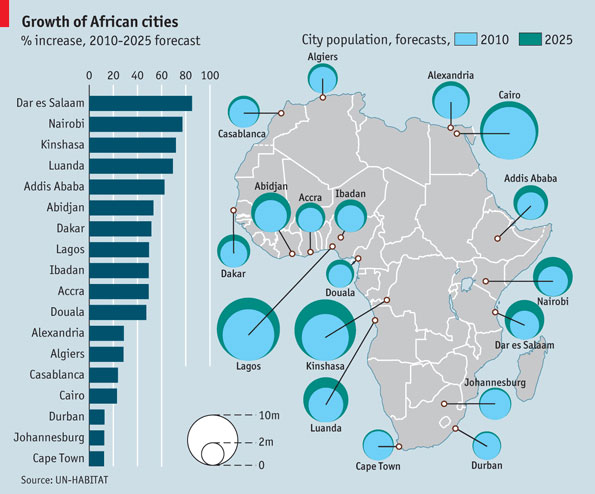
Can we stop history repeating itself?
By Heidi Chow
Over a hundred years ago, European countries carved up the continent of Africa. By 1914, only Liberia and Ethiopia remained independent. This blatant grab for land and control was masked by claims of philanthropy. The colonialists said that the people of Africa needed civilising and that they would bring their modernising ways to the African people. They claimed that the land was empty and so they were justified in taking it. But no amount of rhetoric could hide the brutal reality that the true beneficiaries of colonialism were the European powers. Meanwhile the people of Africa were robbed of their land, lost control of their resources and millions died from forced labour. >>> more
|
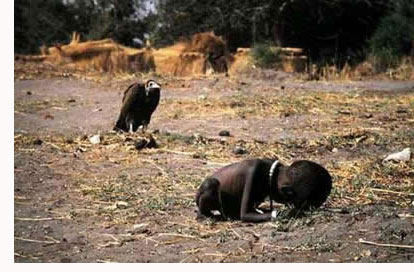
Vulture waits for a starving child to die.
Sudan, Africa 1993:
In 1993, South African photojournalist Kevin Carter took a picture that made the world weep. He was told not to touch the children for fear of transmitting disease.
Carter was part of a group of four fearless photojournalists known as the "Bang Bang Club" who traveled throughout South Africa capturing the atrocities committed during apartheid. He was arrested several times for violating a South African ban on reporting of the domestic conflict. Haunted by the horrific images from Sudan, Carter committed suicide in 1994, 3 months after winning the Pulitzer Prize for photography. >>> more
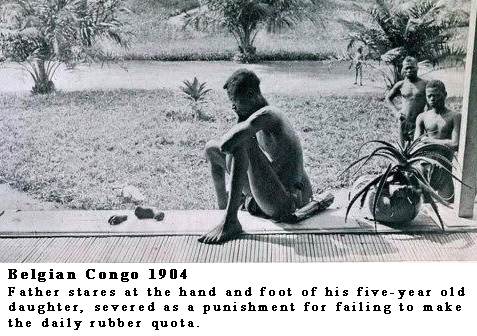
Dark History of Congo Rubber Exploitation
By Ranjith MR
March 7, 2017
In the Berlin Conference of 1884 through 1885, King Leopold II of Belgium succeeded in convincing the major powers that his interests in Congo were purely philanthropic and all he wanted was to bring civilization to Congo. . . The world came to know of these inhuman brutalities through the hard work and dedication of one man – Edmund Dene Morel. . . . One of history’s most under-estimated heroes, Edmund Dene Morel was a fearless advocate of truth. He persuaded missionaries, travellers and the exploited victims of Congo to speak out the truth and published them his magazine West African Mail. These revelations had their impact to the extent that the British House of Commons passed a resolution on Congo in 1903. Subsequently, the British Consul in the Congo, Roger Casement, was sent for an investigation. >>> more
The Growing Problem of Child Slavery
In the cocoa industry alone, 64% of the children are younger than 14 and 40% of the children are girls. Children often begin working at 6 am, work 12-hour days and are beaten regularly. . . . In 2013-2014, an estimated 1.4 million children aged 5 years old to 11 years old worked in agriculture in cocoa-growing areas, approximately 800,000 of them engaged in hazardous work, including working with sharp tools and agricultural chemicals and carrying heavy loads. . . .
Mixing and applying chemicals can be hazardous due to pesticide contamination, especially because no protective clothing is worn during application. . . . >>> more

The careless, astonishing cruelty
of Barack Obama’s government
By George Monbiot
The Guardian February 2015
The US, it seems, couldn’t care less if it causes a humanitarian crisis in Somalia, one of the world’s poorest countries.
Let me introduce you to the world’s most powerful terrorist recruiting sergeant: a US federal agency called the office of the comptroller of the currency. Its decision to cause a humanitarian catastrophe in one of the poorest, most troubled places on Earth could resonate around the world for decades.
Last Friday, after the OCC had sent it a cease-and-desist order, the last bank in the United States still processing money transfers to Somalia closed its service. The agency, which reports to the US treasury, reasoned that some of this money might find its way into the hands of the Somali terrorist group al-Shabaab. It’s true that some of it might, just as some resources in any nation will find their way into the hands of criminals (ask Hm=SBC). So why don’t we shut down the phone networks to hamper terrorism? Why don’t we ban agriculture in case fertiliser is used to make explosives? Why don’t we stop all the clocks to prevent armed gangs from planning their next atrocity?
Ridiculous? In fact it’s not far off. Remittances from the Somalian diaspora amount to $1.2bn-$1.6bn a year, which is roughly 50% of the country’s gross national income, and on which 40% of the population relies for survival. Over the past 10 years the money known to have been transferred to suspected terrorists in Somalia amounts to a few thousand dollars. Cutting off remittances is likely to kill more people than terrorists will ever manage.
During the 2011 famine in Somalia, according to a British government [2013 report "Safer Corridors- Rapid Assessment"(pdf)], British Somalis saved hundreds of thousands of lives by remitting money ... reaching family members before aid agencies could mobilise”. Government aid agencies then used the same informal banking system – the hawala – to send money to 1.5 million people, saving hundreds of thousands more. Today, roughly 3 million of Somalia’s 7 million people are short of food. Shut off the funds and the results are likely to be terrible. Money transfers from abroad also pay for schooling, housing, business start-ups and all the means by which a country can lift itself out of dependency and chaos. Yes, banking has its uses, as well as its abuses.
Somalia might be one of the poorest nations in the world, but its remittance system is widely seen as a model for other nations. Shifting e-money via the mobile phone network, hawala brokers charge only 5% interest, against a global average of 9% and an African average of 12%. In a nation held to ransom by well-armed thugs, and lacking almost all infrastructure, these remarkable people – often motivated as much by a desire to keep their country alive as to make money – supply tiny desert settlements all over the nation with scarcely any losses.
Hawala is one of Africa’s great success stories. But it can’t work unless banks in donor nations are permitted to transfer funds to Somalia. The US treasury’s paranoid rules threaten remittances from all over the world, as no bank wants to lose American business.
No one suffers more from al-Shabaab than the Somalis. It epitomises that combination of menace and absurdity satirised in Chris Morris’s film Four Lions. In the areas these few thousand men control, they have tried to ban samosas on the grounds that their triangular shape invokes the holy trinity. They whip women for wearing bras; have pledged to prohibit the internet; have imposed fundamentalist Wahhabi doctrines on a largely Sufi population; have tried to stop food aid; and have waged war on vaccination programmes, causing outbreaks of polio and measles. Yesterday they murdered another MP.
So you take a country suffering from terrorism, massive youth unemployment and the threat of famine, and seek to shut off half its earnings. . . . .So in order to protect American jobs, the US government fails to take action over the illegal transfer of billions of dollars, while sentencing people in the Horn of Africa to death because of the illegal transfer of a few thousand. There is a word for these double standards: racism.
By contrast, the British government comes through this surprisingly well. While recognising that money could be transferred to terrorists in Somalia, its response is not to ban the remittance system but to try to make it more transparent. In 2014, working with people throughout the money chain, it ran a pilot project to improve the system’s security.
But the US has simply shut the door and walked away... >>> more |
 Back to top Back to top
The End of Poverty (2008)
Watch on YouTube
Directed and Written by Phillipe Diaz and narrated by Martin Sheen
Produced by Cinema Libre Studio, in collaboration with the Robert Schalkenbach Foundation.
Crirtically reviewed by Professor Tyler Cowen "Anti-Capitalist rerun"
Why Global Poverty?
by Clifford W. Cobb, Philippe Diaz, 2009
A Companion Guide to the Film "The End of Poverty?"
Archived
Global poverty did not just happen.
It began with military conquest, slavery, and colonization: the seizure of land, minerals, and forced labor. It has persisted until the present as a result of unfair debt, trade, and tax policies, which the rich nations of the North have imposed on the nations of the global South.
|
"The wealthy have state-help. The poor have self-help"
GlobalPOV Project, University of California, Berkeley
Based on Prof. Ananya Roy's popular Global Poverty class at the University of California, Berkeley, The #GlobalPOV Project video series combines critical social theory with improvised art and live-action sketch to explore issues of global poverty, development and foreign aid.
The #GlobalPOV Project is a program of the Global Poverty and Practice (GPP) Minor. Based at the Blum Center for Developing Economies, University of California, Berkeley, the GPP Minor creates new ways of thinking about poverty, inequality and undertaking poverty action.
See MORE GlobalPOV Project videos: YouTube Channel
Join the #GlobalPOV conversation
Website: http://blumcenter.berkeley.edu/globalpov
Facebook: https://www.facebook.com/GlobalPOV

It is time for America to reconsider who is dependent on welfare.
Poverty is not only the lack of income and wealth but also the poverty of power. A key part of the poverty of power is to be defined as dependent: dependent on charity, handouts, welfare. Yet, it is the wealthy, not the poor, who are dependent on government subsidies. To transform dependency into self-determination is the work of poor people's movements. To demonstrate the dependency of the wealthy on welfare as well as on the labor of the poor must be our collective work. >>> more |
|
"Who Sees Poverty?"
Published on Nov 27, 2012
Poverty exists. That it exists, that it persists, in the 21st century is an obscenity. We want to end this poverty. We want to make poverty history. But we have to ask ourselves: Who is the "we" who sees poverty? When we see poverty, what is that we see? And finally, how do we act upon these ways of seeing?
|
|
“Who Profits From Poverty?”
Published on May 6, 2013
The third video in The #GlobalPOV Project series is an exploration of the poverty business. The poor pay more for everything, and such transactions are highly profitable for those selling goods and services to the poor. Profits are made on the labor of the poor, the consumption of the poor, and the debt of the poor; meanwhile the poor remain—poor. So who profits from poverty? |
"Who is Dependent on Welfare?"
Published on Dec 3, 2013
In 1999 the U.S. government spent $48 billion more on homeownership subsidies for the middle classes and the wealthy, than on public housing and rental subsidies for the poor.
"Yet, there is no stigma attached to this dependency.
In fact, it is seen as an entitlement."
Poverty is not only the lack of income and wealth but also the poverty of power. A key part of the poverty of power is to be defined as dependent: dependent on charity, handouts, welfare. Yet, it is the wealthy, not the poor, who are dependent on government subsidies.
To transform dependency into self-determination is the work of poor people's movements. To demonstrate the dependency of the wealthy on welfare as well as on the labor of the poor must be our collective work. >>> more |

The case for a new form of democracy
based on human rights to the earth as a birthright.
Public Finance Based On Early Christian Teachings
by Alanna Hartzok, Co-Director, Earth Rights Institute and UN NGO Representative, Christianity and Human Rights Conference
Samford University, Birmingham, Alabama
November 2004
This paper makes a case for a new form of democracy based on human rights to the earth as a birthright, linking this to the Judeo-Christian Jubilee Justice tradition and Old and New Testament teachings. It presents a tax fairness practical policy approach based on the ethical stance of these teachings.
The United Nations Millennium Declaration was adopted by the world's leaders at the Millennium Summit of the United Nations in 2000. Secretary General Kofi Annan has said that the Declaration "captured the aspirations of the international community for the new century" and spoke of a "world united by common values and striving with renewed determination to achieve peace and decent standards of living for every man, woman and child." >>>more |
Back to top |
|
|

|
|

